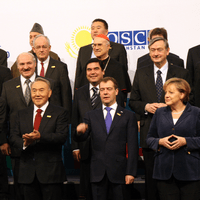Leaders of the Organization for Security and Cooperation in Europe (OSCE) are currently gathered in Astana, Kazakhstan, for the group's first summit in more than a decade. The OSCE has many responsibilities due to its comprehensive agenda, but its most urgent task is to help mobilize greater support for Afghanistan. Although Afghanistan does not belong to the OSCE, several member states border the war-torn country, while many more have sent military forces to help combat the Taliban insurgents threatening the internationally recognized Afghan government.
The challenges facing the OSCE in Afghanistan derive mainly from the porous borders between northern Afghanistan and several of the OSCE's Central Asian members. The lax border regimes between Russia and the former Soviet republics of Central Asia in turn facilitate the smuggling of narcotics and other contraband through Eurasia into Russia and Europe. The global dimensions of the narcotics trafficking means that Afghan-origin heroin and other opiates affect many OSCE member states, leading to death, disease, corruption, and other socioeconomic costs. Moreover, revenues from narcotics-trafficking provide financing for Afghan insurgents and other anti-governmental groups, which serves to further undermine Afghanistan's security and socioeconomic development.
The OSCE can deliver important assets to the coalition of countries and organizations seeking to promote stability and prosperity in Afghanistan. The OSCE has a comprehensive, holistic approach to security that integrates security, economics, and human rights. The organization also has the largest membership of any of the numerous regional security organizations active in Afghanistan. Thanks to Afghanistan's designation in 2003 as a Partner for Cooperation, the OSCE has been engaged with Kabul for a longer period than have some other Eurasian security organizations, such as the CSTO and the SCO. The OSCE also has an extensive network of field operations in Central Asia, which can help host-countries manage their border crossings with Afghanistan.

